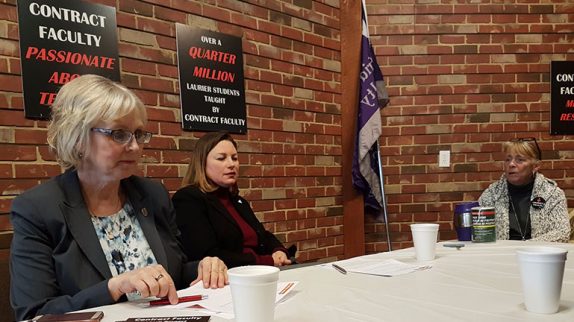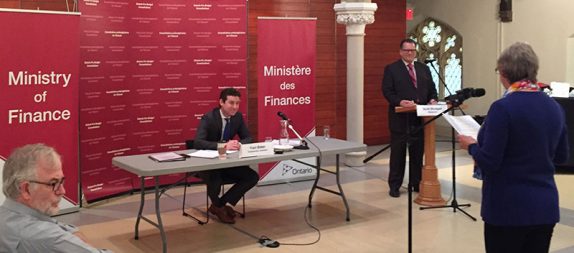On February 11 and 12, 2017, OCUFA held its second Board meeting of the 2016-17 academic year. The weekend provided an opportunity to discuss recent developments in higher education and review the organization’s current priorities: faculty pensions, contract faculty and faculty complement, university funding, and university governance. And, at a special reception, the Lorimer Award for excellence in bargaining and the Status of Women Award of Distinction were presented.
Contract faculty and faculty complement
OCUFA continues to spearhead initiatives aimed at advancing fairness for contract faculty. As part of this campaign, special contract faculty-specific issues of OCUFA Report are published quarterly, providing:
- information on the work of the Contract Faculty and Faculty Complement Committee;
- updates on the organizing contract faculty have been doing at the local level; and
- profiles highlighting the teaching, research, and service contributions of contract faculty members.
Following the record participation in CAUT’s Fair Employment Week this past fall, the Contract Faculty and Faculty Complement Committee is now planning faculty association solidarity social events at both Western and Windsor universities. The committee is also planning a social media day of action for March 3 that will highlight the intersection between university governance and challenges facing contract faculty.
University funding
Since 2015, the provincial government has been developing a new funding model for Ontario’s universities. At the meeting, Glenn Craney, Assistant Deputy Minister in the Ministry of Advanced Education and Skills Development, gave a presentation on the structure of the new funding formula and the second round of Strategic Mandate Agreements, through which the new funding model will be implemented.
The new model will consist of three funding envelopes based on enrolment, existing special purpose grants, and differentiation priorities. While the first two funding envelopes are fairly straightforward, the addition of a differentiation envelope based on performance metrics, where some university funding will be at-risk, raises concerns for OCUFA. Although this new formula will be implemented through the upcoming round of Strategic Mandate Agreements – set to be completed in June – the government still has not offered clarity on exactly how the differentiation envelope will work or what metrics will be used to determine whether a university is meeting its performance targets. While the differentiation envelope will be in place for this round of SMAs, the government has confirmed that no funding will be “at-risk” until the third round of SMAs are implemented three years from now.
OCUFA has been in regular contact with the Ministry to articulate the faculty view that a performance-based funding model will harm the quality of education and negatively impact faculty, students, and institutions. Members will be kept up-to-date about the new funding model as more details emerge.
Collegial governance
University governance, and a shift away from collegiality, continues to be a concern for members. To help develop strategies for addressing these challenges, OCUFA will be hosting a series of conference calls to share developments on individual campuses. During the first conference call, concerns were raised about lack of transparency in presidential searches, lack of meaningful engagement at Senate meetings, unrepresentative Boards of Governors, the importance of faculty input in the upcoming SMAs, and unreasonable compensation for senior administrators.
The latter issue is one that has been raised in light of a recent proposal to dramatically increase compensation for executives at Ontario’s colleges. The province has told the colleges that their proposals are out of line. Under the province’s new Executive Compensation Framework, universities are also required to publicly post their own proposals for executive compensation increases by September 2017.
Pensions
OCUFA continues to keep member associations up-to-date about changes to solvency regulations. In addition, OCUFA staff have been monitoring the possible implications of changes to current pension regimes. In the coming months, OCUFA will offer member associations pre-bargaining sessions focusing on pension strategies. Work continues on the initiative aimed at creating a voluntary multi-employer jointly sponsored pension plan (JSPP) in the university sector.
OCUFA’s 2017 pre-budget submission and other issues
The details of OCUFA’s 2017 pre-budget submission were reviewed at the meeting. While OCUFA has commended the government for aiming to make postsecondary education more accessible, there are serious concerns about the fact that faculty hiring is not keeping pace with student enrolment. Without more public investment, there is a real possibility that the quality of university education in Ontario will suffer. Board Directors also discussed recent collective bargaining developments, grievance trends, campus equity initiatives, and other important issues.
Guest speakers
In addition to Glen Craney, the Board heard from two other guest speakers: Paul Elliot, President of the Ontario Secondary School Teachers Federation (OSSTF) and Greg Lyle, President of Innovative Research Group Inc.. Paul provided a presentation on the process that the OSSTF has undertaken to develop a shared benefits plan across the education sector. Greg discussed the results of an OCUFA-commissioned poll that compares perceptions of higher education in Canada and the US, as well as an Innovative Research poll which surveys and compares public sentiments that influenced last year’s US election with those in Canada
Awards celebration
Finally, this weekend’s meeting provided an opportunity to celebrate exceptional contributions to the working conditions of faculty across the province. At a special awards luncheon, former Queen’s professor and four-time Chief Negotiator for the Queen’s University Faculty Association Allan Manson was presented with the Lorimer Award for his work to protect and promote the interests of Ontario’s academic staff through collective bargaining. Then, Helene Cummings, an adjunct professor at Brescia University College and former Chair of OCUFA’s Status of Women Committee, was presented with the Status of Women Award of Distinction for her work to improve the lives and working conditions of academic women.
The next OCUFA Board of Directors meeting will be held in May.








